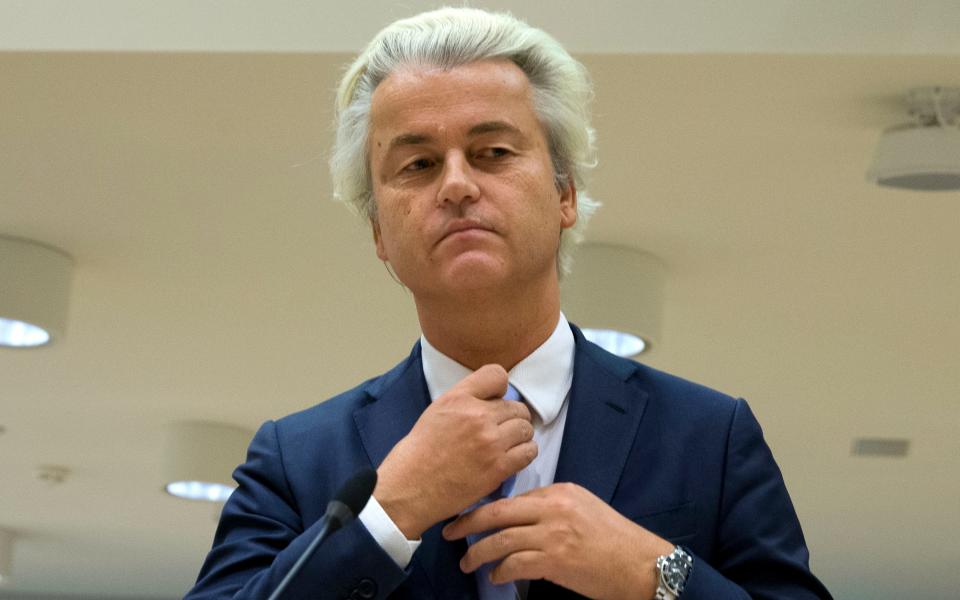Dutch election: Polls open as far-Right candidate Geert Wilders takes on Mark Rutte

Polls have opened in the Dutch general election following a campaign largely defined by questions of national identity and seen as a bellwether for the rise of rightwing populism in Europe.
Polls on the eve of the vote show Geert Wilders, the leader of the anti-Islam and anti-EU Party for Freedom, running just behind front-running Mark Rutte, the incumbent prime minister and leader of the liberal conservative VVD party.
Rotterdam destroyed by Nazis. Today w/ Moroccan-born mayor. Anyone seeing fascism there is detached from reality. We are Europeans & proud.
— Donald Tusk (@eucopresident) March 15, 2017
Mr Wilders one page manifest promises to leave the European Union, bar immigrants from muslim countries, close mosques and ban the Quran.
Mr Rutte has said that would lead to chaos, but has moved his campaign to the right on some issues in response to Mr Wilders’s success.

When do polls close?
Polls close at 9pm local time - that's 8pm UK time. Neither party is expected to take more than 30 percent of the vote, however, and polls suggest about 40 percent of voters remains undecided the day before the vote.
There are 28 parties standing for the country’s 150 seat parliament. It can take months for a coalition government to be formed.
Mr Rutte and the leaders of most other major parties have ruled out entering a coalition with Mr Wilders, meaning the controversial fire brand is unlikely to enter government even if he were to win 30 seats, the maximum polls suggest he can hope for.

Mr Wilders’ saw his poll number drop after a televised debate with Mr Rutte on Monday night, however.
The Dutch vote is the first of several key national elections in Europe this year, and will be watched carefully for signs that voters are turning away from the mainstream towards right wing populists like Mr Wilders.
Marine Le Pen, leader of the far-right French National Front and an ally of Mr Wilders, will make a bid for the French presidency at elections in April and May.
Populists including Alternative for Germany, an anti immigrant party, hope to challenge Angela Merkel’s grip on power in the German Federal elections in September.
When do results come in?
It is understood that the first results, from some of the Netherlands' smallest towns, could arrive as soon as one hour after the polls.
In the 2012 election, Schiermonnikoog , a small island, was the first to declare the result.
The larger towns and cities will take much longer, with estimates of their results being announced at around 2 or 3am.
It is unclear when the final result will be announced - in 2012, the final results were announced on September 17, five days after the election took place.
Can Geert Wilders win?
That depends on who you ask - some polls have suggested that Mr Wilders' Freedom Party may emerge as the second largest party. But in the Netherlands, coalition politics are the norm, and few parties would openly consider joining hands with this extremely controversial figure.
Mr Rutter's VDD party have absolutely ruled out a coalition, and other far-right parties are unlikely to win enough votes to allow them to form a pact with the Wilders camp.

However, as Peter Foster, our Europe editor, wrote earlier this week, Mr Wielders already wields considerable power even though he hasn't won any yet:
The persistent attraction of divisive figures like Mr Wilders - who was convicted last December of inciting hatred against Moroccans - has weakened mainstream leaders like Mr Rutte. He felt he had little choice but to take a tough line with Turkey, in the process boosting the same anti-foreigner, identitarian politics that Mr Wilders has made his trademark. (In another context, this is the same Mr Rutte who earlier this year put adverts in the main Dutch newspapers warning migrants to “be normal or be gone”, again in order to outflank Mr Wilders.)
Wilders on polling day: Genie will not go back in bottle
Mr Wilders voted at a school in a modern suburb of The Hague just after 9 AM.
Dressed in a navy blue suit and accompanied by a phalanx of body guards and Mr Wilders seemed up beat as he cast his ballot.
Mr Wilders said it would be "great" if he ended up as the next Dutch prime minister, but declined to speculate on the outcome of the vote.
"Let's wait and see what today will bring. But whatever the result is today the genie will not go back in the bottle. This patriotic revolution will continue," he said, when asked about the significance of the vote for Europe.

